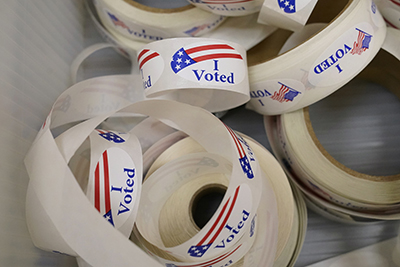AARP Eye Center
How to Vote in Oklahoma’s 2024 Elections
Important dates and election information

- Last day to register to vote: Friday, Oct. 11
- Last day to request an absentee ballot: Monday, Oct. 21, by 5 p.m. (received)
- Election Day: Tuesday, Nov. 5
Voting at a glance
- Voter registration: Use the OK Voter Portal to check your voter registration status.
- Absentee voting: All registered voters can cast an absentee ballot. Most absentee ballots must be notarized.
- Early voting: You can cast your ballot from 8 a.m. until 6 p.m. Wednesday, Oct. 30, through Friday, Nov. 1, and from 8 a.m. until 2 p.m. on Saturday, Nov. 2. Check the state elections website for locations.
- Voting at the polls: Polls are open from 7 a.m. to 7 p.m. Find your polling place using the OK Voter Portal.
Recent voting changes in Oklahoma
Online voter registration using the OK Voter Portal is available, following its July 2023 launch.
Voters who are visually impaired can apply online for an accessible absentee ballot using the OK Voter Portal.
How to register to vote
Register online, by mail or in person by Friday, Oct. 11.
- Online: Register online using the OK Voter Portal. An Oklahoma driver’s license or state ID and a signature on file from those documents are required.
- By mail: Visit the OK Voter Portal to fill out and print a voter registration application form. Applications are also available at your county election board office and at most post offices, public libraries and other locations listed on the state election board’s website. Mail the completed form to your county election board. It must be postmarked by Friday, Oct. 11.
- In person: Register to vote at your county election board. You also can register to vote during an appointment for a driver’s license or state ID.
Registering to vote on Election Day
Oklahoma does not permit voter registration on Election Day.
Check your voter registration status
Find your registration status using the OK Voter Portal.
How to request an absentee ballot
Any registered voter can request a no-excuse absentee ballot by 5 p.m. on Monday, Oct. 21.

- Online: Use the OK Voter Portal. Or, email or fax a completed application to your county election board.
- By mail: Download and print an application form and mail it to your county election board, or contact your county board and request that a form be mailed to you.
- In person: Visit your county election board office to fill out an application or to drop off a completed application.
Returning an absentee ballot
Complete your ballot, place it in the secrecy envelope and seal the envelope. Then place the secrecy envelope in the affidavit envelope. You must fill out the affidavit envelope completely, sign it and have it notarized, if using a standard absentee ballot.
Notaries are not allowed to charge a fee to notarize an affidavit envelope. Many banks, credit unions, libraries, businesses and organizations offer free affidavit envelope notary services to customers and non-customers.
Place the completed affidavit envelope in the return envelope before submitting it to your county election board.
- By mail: Ballots returned by mail must be received by your county election board by 7 p.m. on Tuesday, Nov. 5.
- In person: You must return your own ballot by the close of business on Monday, Nov. 4, and show proof of identity such as an Oklahoma driver’s license or voter ID card.
Track the status of your ballot through the OK Voter Portal.
Voting in person before Election Day
Voters can cast an absentee ballot in person from 8 a.m. until 6 p.m. Wednesday, Oct. 30, through Friday, Nov. 1, and from 8 a.m. until 2 p.m. on Saturday, Nov. 2, in the county where they are registered to vote. You will need to show proof of identity such as an Oklahoma driver’s license or voter ID card. Check the state elections website for locations.
Upon arrival, voters will be asked to complete a short application for an in-person absentee ballot and to sign an in-person absentee voting log before receiving their ballot.
Voting at the polls on Election Day
Polls are open from 7 a.m. to 7 p.m. Find your polling place on the OK Voter Portal.
Sample ballots will be available on the OK Voter Portal.
Voter ID requirements on Election Day
You must show unexpired proof of identity that includes your name and a photo ID, such as an Oklahoma driver’s license, U.S. passport or military ID. You also can show a voter identification card issued by your county election board.
If you don’t have an acceptable form of ID, you can cast a provisional ballot. You’ll need to sign an affidavit confirming your identity. Election officials will determine whether the provisional ballot is legitimate after Election Day.
Voting with a disability
You can bring someone to the polls to help you vote. That person cannot be your employer or from your union.
Voters who have physical disabilities or are visually impaired can use a device that allows them to hear an audio version of the ballot and make their choices.
Voters who are visually impaired can apply online for an accessible absentee ballot using the OK Voter Portal. You also can print and complete an application and submit it to your county election board online, in person or by mail. More information is available on the state election board’s website.
Voting from a nursing home or veteran’s center
Voters who are residents of nursing homes or veterans centers or are incapacitated and can’t make it to the polls, along with those who are caring for someone who is incapacitated, can apply for a Physically Incapacitated Absentee Ballot through the OK Voter Portal. Voters who use a Physically Incapacitated Absentee Ballot do not need to have their absentee ballot affidavit notarized. Instead, their signatures must be witnessed by two people.
Residents living in nursing homes and veteran’s centers in the county where they are registered to vote can apply for an absentee ballot to be delivered by their county’s bipartisan Absentee Voting Board. Board members will visit within 15 days of the election and will provide balloting materials as well as witness affidavit signatures. They also will return the voted ballots to the county election board.
Editor’s note: This guide was originally published on Jan.16, 2024, and has been updated with new information about voting in the 2024 elections.
Maura Kelly Lannan is a writer, editor and producer for AARP who covers federal and state policy. She has worked as a reporter for the Associated Press, the Chicago Tribune and the Waterbury, Connecticut, Republican-American. She also has written for Bloomberg Government, The Boston Globe and other publications.






























































